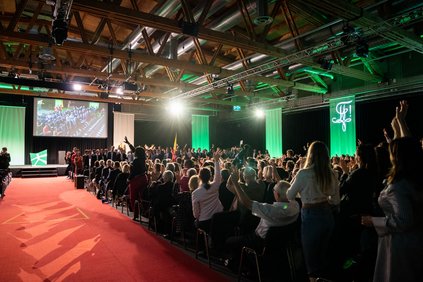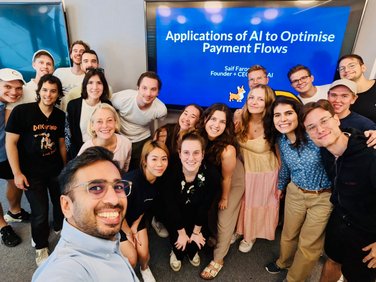Campus - 09.08.2023 - 10:33
HSG and ETH Zurich students jointly develop ideas for campus use
HSG students are developing ideas in two courses on how the campus could be used for innovative forms of learning. Some of this work involves collaboration with ETH Zurich architecture students. The development work is focused on HSG’s newest building, SQUARE.

Teaching innovation: HSG and ETHZ students jointly develop ideas for campus use
In a new Master’s course, the University of St.Gallen (HSG) is bringing its students together with architecture students from ETH Zurich. Together, in the autumn semester 2023 in the course “Building the future – organizations in the transition between architecture and society”, they will investigate the use of SQUARE and attempt to influence this through interventions.
The building, opened at the start of 2022, has an open three-storey structure internally, features flexibly furnishable rooms and is intended to promote interaction and new forms of teaching in this way. “The HSG students will first ascertain how people in SQUARE work and engage in debate by means of observations and interviews. Using this as a basis, the ETH and HSG students will jointly develop spatial interventions,” explains HSG sociologist and lecturer Niklaus Reichle. The research collective Unexplored Realities at the HSG Institute of Sociology is conducting the course together with the ETHZ Chair for Architectural Behaviourology and SQUARE’s director’s office.
Students discuss their ideas with SQUARE architect Fujimoto
The nature of the interventions is still open. Improvised furniture, artistic installations and even productions and activities involving students on location are conceivable, for example. These minor interventions in the operation of SQUARE are intended to prompt new behaviours and question current use to an extent, according to Reichle.
The students will discuss their ideas with Japanese architect Sou Fujimoto on location in November during the course. The latter designed SQUARE and visited the building for the first time in spring 2023. He will return to his building in autumn as “Personality in Residence”.
“Apart from the investigation and further development of teaching and learning in SQUARE, the course is intended to bring together the expert knowledge of future architects and managers,” says Reichle. “Such an exchange is fruitful since architectural and business management perspectives are often different. However, when realizing buildings, both groups need to cooperate closely,” points out HSG lecturer Christoph Michels. The qualified ETH architect, who has a doctorate in economics, will be teaching a Bachelor’s course this autumn at HSG with the title “The other university – atmospheres of research and teaching”.
Students will grapple with the influence of architecture on university learning and teaching in this course. They too will develop scenarios of how the HSG campus could be used differently or in new ways as part of teaching. At the end of the semester, they will present their ideas to those responsible for teaching and campus development as suggestions for further planning.
Michels will let the students work creatively in this regard: for example, they will produce prototypes of learning locations and formats using collages and sketches. “The idea is first to create and only subsequently to reflect, reject or further develop,” Michels explains. This process, he reports, disrupts the conventional patterns of learning and development processes. He also encourages students to present their ideas in the form of an exhibition and small performances/role plays.
Regular teaching staff expand seminar rooms in SQUARE
According to Michels and Reichle, the question of the influence of architecture on university teaching and learning at HSG has acquired new significance with the opening of SQUARE. In parallel to his teaching work, sociologist Reichle is currently investigating in a research project how SQUARE functions as a place of learning and work. “This report could also provide findings for the didactic conception of the Platztor campus,” Reichle adds. At Platztor in the centre of St.Gallen, HSG is planning its own campus, which from 2029 will probably provide space for about 3,000 HSG members.
In addition, SQUARE is also providing fresh impetus for teaching at HSG, according to Reichle and Michels. “For example, regular teaching staff are leaving the seminar rooms in SQUARE with their students because further learning locations and opportunities for practical exercises are available right outside the door,” says Reichle, who has observed operations in SQUARE ethnographically for his research project.
More articles from the same category
This could also be of interest to you
Discover our special topics
















